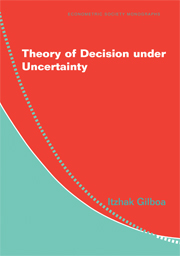20 - Future Research
Published online by Cambridge University Press: 05 January 2013
Summary
The discussion in the previous chapters offers several challenges to current research. The first is to develop better models of probabilities, in particular, of objective probabilities. It would be desirable to have probabilities that use analogies to cases, but that also employ general rules and theories. Beyond combination of case-based and rule-based reasoning, we may wish to model explicit causal theories, as is done by Bayesian networks (Pearl, 1986). These may be combined with similarity-weighted frequencies to generate better probabilistic assessments. In such a model, the Bayesian network reflects the presumed causal relationships, and the conditional probabilities attached to edges in the network can be derived from similarity-weighted frequencies employing an empirical similarity function.
Relaxing the requirement of probabilistic representation of beliefs, one can go back to models involving sets of probabilities, or nonadditive measures, and ask where do these emerge from, trying to model the cognitive processes that generate them. And if one continues to be more modest in one's demands, one may ask whether models of qualitative likelihood relations can be upgraded to include not only analogies and case-based reasoning, but also models, theories, and rules.
Going further down the line, we can also decide to forget about beliefs altogether. It is possible that there is no rational way to generate beliefs in some of the complicated examples we were discussing, and we may have to learn to live with this fact.
Information
- Type
- Chapter
- Information
- Theory of Decision under Uncertainty , pp. 188 - 190Publisher: Cambridge University PressPrint publication year: 2009
